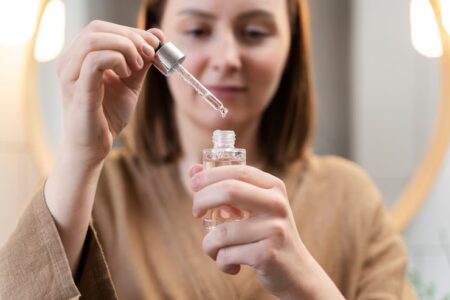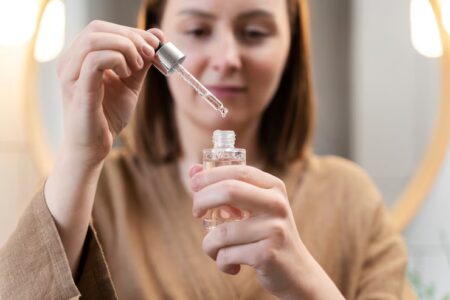The summer season requires adjustments in your skincare approach, particularly when it comes to anti-aging. While rich moisturizers may work in colder months, warmer weather calls for lighter yet effective alternatives. Among them, face serums stand out due to their concentrated ingredients and fast absorption. This article focuses on how to select and use anti-aging face serums to refresh your summer skincare routine effectively.
Why Use Face Serums in Summer?
Face serums differ from moisturizers in texture and composition. They are typically lightweight, water- or gel-based, and contain high concentrations of active ingredients designed to address specific skin concerns. During summer, excess heat and sun exposure accelerate skin aging. Fine lines, dullness, and uneven skin tone can become more visible, especially if the skin is dehydrated or overexposed to UV rays.
A well-formulated anti-aging serum can help minimize these issues by:
- Reducing oxidative stress with antioxidants
- Supporting collagen production
- Restoring hydration without clogging pores
- Improving overall skin texture and tone
Key Ingredients to Look for in Anti-Aging Serums
Vitamin C
A staple in summer skincare, Vitamin C helps neutralize free radicals generated by sun exposure. It also supports collagen synthesis and fades hyperpigmentation, making it useful for addressing sunspots and uneven skin tone.
Hyaluronic Acid
Hydration is crucial in warm weather, especially when air conditioning and sun exposure can dehydrate the skin. Hyaluronic acid helps retain moisture, improving skin elasticity without adding heaviness.
Niacinamide (Vitamin B3)
Niacinamide offers a range of benefits, including reducing the appearance of fine lines and supporting the skin’s barrier function. It is gentle enough for most skin types and works well with other ingredients in summer serums.
Peptides
Peptides are short chains of amino acids that promote collagen production and skin regeneration. They are effective in softening fine lines and enhancing firmness over time.
Resveratrol
This antioxidant, often derived from grapes, supports skin health by reducing oxidative damage. It’s well-suited for evening use in summer routines focused on anti-aging.

Choosing the Right Serum for Your Skin Type
Oily or Acne-Prone Skin
Opt for lightweight, water-based serums that contain ingredients like niacinamide, green tea extract, or zinc. Avoid oil-heavy formulations, which can lead to breakouts during the summer months.
Dry or Dehydrated Skin
Look for serums with hyaluronic acid, ceramides, or squalane to maintain moisture without causing heaviness. Avoid alcohol-based products that may increase dryness.
Combination Skin
Choose a balancing serum that contains ingredients like niacinamide or lightweight peptides. These can target signs of aging while helping to regulate oil production.
Sensitive Skin
Stick to minimal ingredient lists and avoid strong exfoliants during the day. Serums with centella asiatica, aloe vera, or oat extracts are generally well-tolerated and supportive of barrier repair.
How to Apply Serums in a Summer Routine
Step 1: Cleanse
Start with a gentle cleanser to remove sweat, sunscreen, and environmental residue. Avoid over-cleansing, as this can strip the skin and increase sensitivity.
Step 2: Apply Toner or Mist (Optional)
A hydrating toner or facial mist can prep the skin for better absorption of the serum.
Step 3: Serum Application
Apply a few drops of your chosen anti-aging serum onto damp skin. Gently press or pat the serum into the skin rather than rubbing it in. This method helps preserve the integrity of the product and reduces potential irritation.
Step 4: Moisturizer
Follow with a light, non-comedogenic moisturizer that suits your skin type. In some cases, if the serum is hydrating enough, you may need only a minimal layer of moisturizer.
Step 5: Sunscreen (Morning Routine)
Use broad-spectrum sunscreen with at least SPF 30. UV protection is essential when using active ingredients like Vitamin C or retinoids, even in serum form.
Tips for Using Anti-Aging Serums in Summer
1. Start Slowly
If you are new to active ingredients, begin with a few applications per week. This helps your skin build tolerance and reduces the risk of sensitivity.
2. Store Properly
Heat and light can degrade certain ingredients, especially Vitamin C. Keep serums in a cool, dark place or store them in the refrigerator if advised by the manufacturer.
3. Don’t Skip Sunscreen
Sunscreen is the most effective tool in preventing signs of aging. Anti-aging serums can only do so much if UV exposure continues without protection.
4. Layer Wisely
In humid conditions, layering too many products can clog pores or feel uncomfortable. Choose multifunctional serums that address multiple concerns at once.
Common Mistakes to Avoid
- Using expired products: Active ingredients lose efficacy over time. Always check the expiration date.
- Combining incompatible actives: Avoid layering Vitamin C with AHAs or BHAs unless formulated to do so.
- Ignoring your skin’s reaction: Redness, peeling, or increased breakouts may indicate overuse or an adverse reaction. Discontinue use and consult a dermatologist if needed.
Conclusion
Adjusting your skincare routine for the summer months doesn’t mean starting over. With the right anti-aging face serums to refresh your summer skincare, you can maintain a well-supported routine that helps protect against environmental stress and premature aging. By selecting appropriate ingredients, applying products in the correct order, and being mindful of your skin’s needs, serums can become an essential part of your seasonal skincare approach.






